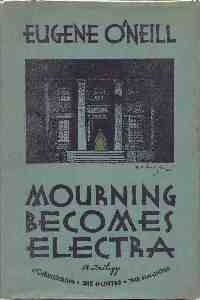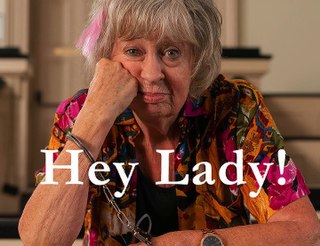
Mourning Becomes Electra is a play cycle written by American playwright Eugene O'Neill. The play premiered on Broadway at the Guild Theatre on 26 October 1931 where it ran for 150 performances before closing in March 1932, starring Lee Baker (Ezra), Earle Larimore (Orin), Alice Brady (Lavinia) and Alla Nazimova (Christine). In May 1932, it was unsuccessfully revived at the Alvin Theatre with Thurston Hall (Ezra), Walter Abel (Orin), Judith Anderson (Lavinia) and Florence Reed (Christine), and, in 1972, at the Circle in the Square Theatre, with Donald Davis (Ezra), Stephen McHattie (Orin), Pamela Payton-Wright (Lavinia), and Colleen Dewhurst (Christine).

Mia Kirshner is a Canadian actress, writer and social activist. She is known for television roles as Mandy in 24 (2001–2005), as Jenny Schecter in The L Word (2004–2009), and as Amanda Grayson in Star Trek: Discovery (2017–present). Her film credits include Love and Human Remains (1993), Exotica (1994), The Crow: City of Angels (1996), Mad City (1997), Not Another Teen Movie (2001) and The Black Dahlia (2006).
Djanet Sears is a Canadian playwright, actor and director, nationally recognized for her work in African-Canadian theatre. Sears has many credits in writing and editing highly acclaimed dramas such as Afrika Solo, the first stage play to be written by a Canadian woman of African descent; its sequel Harlem Duet; and The Adventures of a Black Girl in Search of God. The complexities of intersecting identities of race, and gender are central themes in her works, as well as inclusion of songs, rhythm, and choruses shaped from West-African traditions. She is also passionate about "the preservation of Black theatre history," and involved the creation of organizations like Obsidian Theatre, and AfriCanadian Playwrights Festival.
The Effect of Gamma Rays on Man-in-the-Moon Marigolds is a play written by Paul Zindel, a playwright and science teacher. Zindel received the 1971 Pulitzer Prize for Drama and a New York Drama Critics' Circle Award for the work.
Sally Gifford Piper, usually credited as Sally Gifford, is a Canadian or American actress. She hosted CBC Television's national children's show, The-X. In 2013 she gained widespread attention for appearing in a viral video showing her appearance radically transformed by Photoshop. In 2014 she appeared in Farmed and Dangerous, a four-part webisode comedy series.
Judith Clare Thompson, OC F.R.S. is a Canadian playwright who lives in Toronto, Ontario. She has twice been awarded the Governor General's Award for drama, and is the recipient of many other awards including the Order of Canada, the Walter Carsen Performing Arts Award, the Toronto Arts Award, The Epilepsy Ontario Award, The B'nai B'rith Award, the Dora, the Chalmers, the Susan Smith Blackburn Award and the Amnesty International Freedom of Expression Award, both for Palace of the End, which premiered at Canadian Stage, and has been produced all over the world in many languages. She has received honorary doctorates from Thorneloe University and, in Nov. 2016, Queen's University in Kingston, Ontario.
Theatre Kingston is a theatre company located in Kingston, Ontario, Canada.
Goodnight Desdemona is a 1988 comedic play by Ann-Marie MacDonald in which Constance Ledbelly, a young English literature professor from Queen's University, goes on a subconscious journey of self-discovery.

Slightly Scarlet is a 1956 American crime film, with some noirish elements, based on James M. Cain's novel Love's Lovely Counterfeit. It was directed by Allan Dwan, and its widescreen cinematography was by John Alton.

Karyn Dwyer was a Canadian actress, whose best known role was as Maggie in the 1999 film Better Than Chocolate.
In The Blood is a play written by Suzan-Lori Parks which premiered at The Joseph Papp Public Theater in 1999. Parks borrowed many aspects from Nathaniel Hawthorne's 1850 novel The Scarlet Letter, and wanted to create a play based on the novel. She originally wanted to call the play Fucking A, but scrapped the idea. She later wrote the story based on the main character from The Scarlet Letter, and turned the story into more modern era, and changed the title to In The Blood. She later wrote a different play that she did title Fucking A.

The Secret Rapture is a 1993 British drama film directed by Howard Davies and starring Juliet Stevenson, Joanne Whalley-Kilmer, Penelope Wilton, and Neil Pearson. The screenplay by David Hare is based on his 1988 play of the same title.
Savannah Smith Boucher, known professionally as Savannah Smith before 1985, is an American actress originally from Springhill, Louisiana. Her younger sister, Sherry Boucher, is a former actress who was the third wife of actor George Peppard.

The Secret Rapture is a 1988 British play by David Hare. Its premiere in the Lyttelton auditorium of the Royal National Theatre was directed by Howard Davies. British revivals of the play have included one at the Salisbury Playhouse in 2001 and at the Lyric Theatre, London in 2003. Hare later adapted it as 1993 film of the same title, also directed by Davies.

Lion is a 2016 Australian biographical drama film directed by Garth Davis from a screenplay by Luke Davies based on the 2013 non-fiction book A Long Way Home by Saroo Brierley. The film stars Dev Patel, Sunny Pawar, Rooney Mara, David Wenham and Nicole Kidman, as well as Abhishek Bharate, Divian Ladwa, Priyanka Bose, Deepti Naval, Tannishtha Chatterjee and Nawazuddin Siddiqui. It tells the true story of how Brierley, 25 years after being separated from his family in India, sets out to find them. It is a joint production between Australia and the United Kingdom.

Kyle is a fictional character in the Child's Play franchise, created by Don Mancini and portrayed by actress Christine Elise McCarthy. She first appeared in John Lafia's Child's Play 2 (1990) and has a cameo appearance in Don Mancini's Cult of Chucky (2017). Kyle is a main character in the Child's Play novels and comic book adaptions.

The Silent Child is a British sign language short film written by and starring Rachel Shenton and directed by Chris Overton, and released in 2017 by Slick Films. It tells the story of Libby, a profoundly deaf four-year-old girl, who lives a silent life until a social worker, played by Shenton, teaches her how to communicate through sign language. The film won the Oscar for Live Action Short Film at the 90th Academy Awards. The film's television debut was on BBC One to an audience of 3.6 million, the film then received an extended period on BBC iPlayer.
Alex Bulmer is a Canadian playwright and theatre artist. Bulmer is the co-founder of the theatre companies SNIFF Inc. and Invisible Flash. She wrote the play Smudge and was a writer for the 2009 Channel 4 series Cast Offs.

Hey Lady! is a Canadian comedy web series that is directed by Adriana Maggs, Will Bowes and Sarah Polley, and airs on CBC Gem. The series was created by playwright Morris Panych for Jayne Eastwood and is Eastwood's first leading role in her 50-year-long career. Eastwood portrays Lady, a wild and foul-mouthed woman in her 70s who is constantly getting into trouble with her friend Rosie.
Valerie Pearson is a Canadian actress from Calgary, Alberta. She is most noted for her performance in the 1991 film Solitaire, for which she received a Genie Award nomination for Best Actress at the 13th Genie Awards in 1992.










